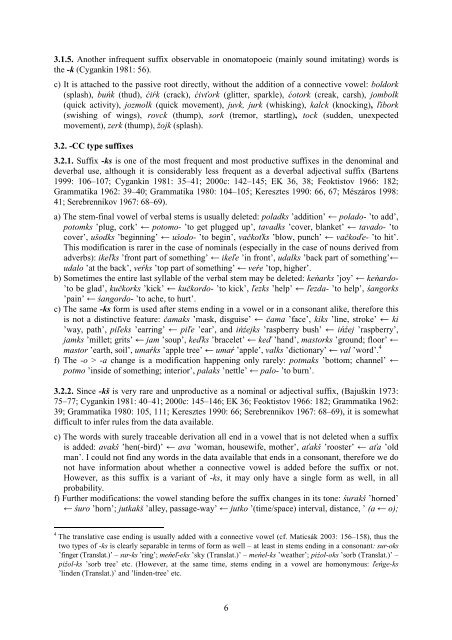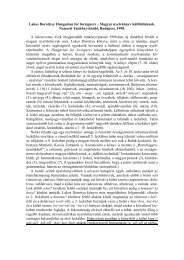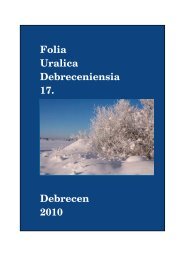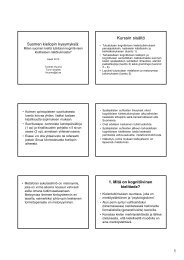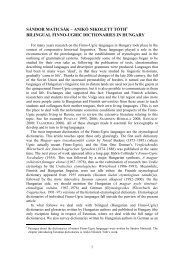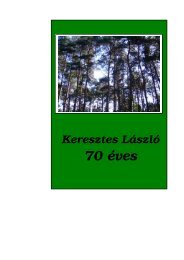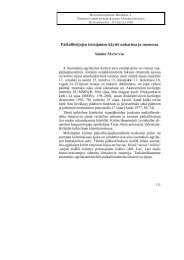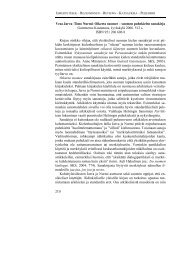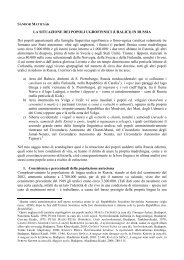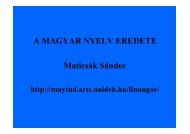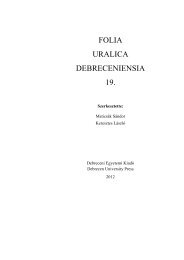Allomorphic variants of Erzya-Mordvin nominal derivational suffixes
Allomorphic variants of Erzya-Mordvin nominal derivational suffixes
Allomorphic variants of Erzya-Mordvin nominal derivational suffixes
You also want an ePaper? Increase the reach of your titles
YUMPU automatically turns print PDFs into web optimized ePapers that Google loves.
3.1.5. Another infrequent suffix observable in onomatopoeic (mainly sound imitating) words isthe -k (Cygankin 1981: 56).c) It is attached to the passive root directly, without the addition <strong>of</strong> a connective vowel: boldork(splash), buńk (thud), ćiŕk (crack), ćivťork (glitter, sparkle), ćotork (creak, carsh), jombolk(quick activity), jozmolk (quick movement), juvk, jurk (whisking), kalck (knocking), ľibork(swishing <strong>of</strong> wings), rovck (thump), sork (tremor, startling), tock (sudden, unexpectedmovement), zerk (thump), žojk (splash).3.2. -CC type <strong>suffixes</strong>3.2.1. Suffix -ks is one <strong>of</strong> the most frequent and most productive <strong>suffixes</strong> in the de<strong>nominal</strong> anddeverbal use, although it is considerably less frequent as a deverbal adjectival suffix (Bartens1999: 106–107; Cygankin 1981: 35–41; 2000c: 142–145; EK 36, 38; Feoktistov 1966: 182;Grammatika 1962: 39–40; Grammatika 1980: 104–105; Keresztes 1990: 66, 67; Mészáros 1998:41; Serebrennikov 1967: 68–69).a) The stem-final vowel <strong>of</strong> verbal stems is usually deleted: poladks ’addition’ ← polado- ’to add’,potomks ’plug, cork’ ← potomo- ’to get plugged up’, tavadks ’cover, blanket’ ← tavado- ’tocover’, ušodks ’beginning’ ← ušodo- ’to begin’, vačkoťks ’blow, punch’ ← vačkoďe- ’to hit’.This modification is rarer in the case <strong>of</strong> <strong>nominal</strong>s (especially in the case <strong>of</strong> nouns derived fromadverbs): ikeľks ’front part <strong>of</strong> something’ ← ikeľe ’in front’, udalks ’back part <strong>of</strong> something’←udalo ’at the back’, veŕks ’top part <strong>of</strong> something’ ← veŕe ’top, higher’.b) Sometimes the entire last syllable <strong>of</strong> the verbal stem may be deleted: keńarks ’joy’ ← keńardo-’to be glad’, kučkorks ’kick’ ← kučkordo- ’to kick’, ľezks ’help’ ← ľezda- ’to help’, śangorks’pain’ ← śangordo- ’to ache, to hurt’.c) The same -ks form is used after stems ending in a vowel or in a consonant alike, therefore thisis not a distinctive feature: čamaks ’mask, disguise’ ← čama ’face’, kiks ’line, stroke’ ← ki’way, path’, piľeks ’earring’ ← piľe ’ear’, and ińźejks ’raspberry bush’ ← ińźej ’raspberry’,jamks ’millet; grits’ ← jam ’soup’, keďks ’bracelet’ ← keď ’hand’, mastorks ’ground; floor’ ←mastor ’earth, soil’, umaŕks ’apple tree’ ← umaŕ ’apple’, valks ’dictionary’ ← val ’word’. 4f) The -o > -a change is a modification happening only rarely: potmaks ’bottom; channel’ ←potmo ’inside <strong>of</strong> something; interior’, palaks ’nettle’ ← palo- ’to burn’.3.2.2. Since -kš is very rare and unproductive as a <strong>nominal</strong> or adjectival suffix, (Bajuškin 1973:75–77; Cygankin 1981: 40–41; 2000c: 145–146; EK 36; Feoktistov 1966: 182; Grammatika 1962:39; Grammatika 1980: 105, 111; Keresztes 1990: 66; Serebrennikov 1967: 68–69), it is somewhatdifficult to infer rules from the data available.c) The words with surely traceable derivation all end in a vowel that is not deleted when a suffixis added: avakš ’hen(-bird)’ ← ava ’woman, housewife, mother’, aťakš ’rooster’ ← aťa ’oldman’. I could not find any words in the data available that ends in a consonant, therefore we donot have information about whether a connective vowel is added before the suffix or not.However, as this suffix is a variant <strong>of</strong> -ks, it may only have a single form as well, in allprobability.f) Further modifications: the vowel standing before the suffix changes in its tone: śurakš ’horned’← śuro ’horn’; jutkakš ’alley, passage-way’ ← jutko ’(time/space) interval, distance, ’ (а ← о);4 The translative case ending is usually added with a connective vowel (cf. Maticsák 2003: 156–158), thus thetwo types <strong>of</strong> -ks is clearly separable in terms <strong>of</strong> form as well – at least in stems ending in a consonant: sur-oks’finger (Translat.)’ – sur-ks ’ring’; meńeľ-eks ’sky (Translat.)’ – meńel-ks ’weather’; piźol-oks ’sorb (Translat.)’ –piźol-ks ’sorb tree’ etc. (However, at the same time, stems ending in a vowel are homonymous: ľeńge-ks’linden (Translat.)’ and ’linden-tree’ etc.6


